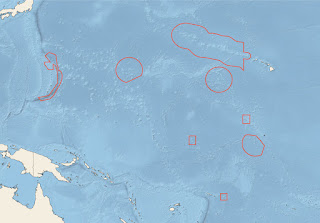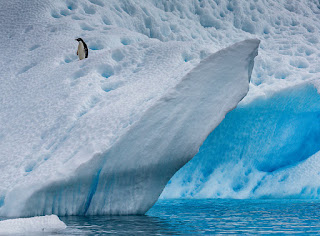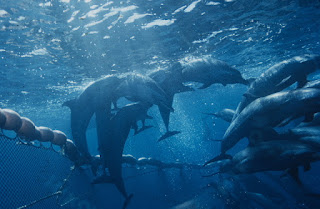1. Sharks Now Protected Wherever They Swim
 A conservation pact has been signed by 126 countries that protects sharks no matter whose waters they swim in. Whale sharks were added to Appendix I, which means the countries are “promising to protect them domestically from killing or capture, and to safeguard their habitats." Other sharks protected include blue sharks (the most highly fished shark in the ocean—and the most migratory), dusky sharks, angelsharks, white-spotted wedgefish, and the common guitarfish.
A conservation pact has been signed by 126 countries that protects sharks no matter whose waters they swim in. Whale sharks were added to Appendix I, which means the countries are “promising to protect them domestically from killing or capture, and to safeguard their habitats." Other sharks protected include blue sharks (the most highly fished shark in the ocean—and the most migratory), dusky sharks, angelsharks, white-spotted wedgefish, and the common guitarfish.
-----------------------------------------------
2. Loss of Federal Protection Would Put Pacific Reefs in Peril The Trump administration is recommending that two protected Pacific reefs—the Pacific Remote Islands National Marine Monument and the Rose Atoll National Marine Monument—be opened to fishing. But Pacific reefs may be in peril without federal protection from fishing. A recent survey of four Pacific seamounts, one in the Papahanaumokuakea National Monument off Hawaii, found that trawling had left a dead zone in its wake. "The devastation...was shocking," reports deep-sea submarine pilot Terry Kerby.
The Trump administration is recommending that two protected Pacific reefs—the Pacific Remote Islands National Marine Monument and the Rose Atoll National Marine Monument—be opened to fishing. But Pacific reefs may be in peril without federal protection from fishing. A recent survey of four Pacific seamounts, one in the Papahanaumokuakea National Monument off Hawaii, found that trawling had left a dead zone in its wake. "The devastation...was shocking," reports deep-sea submarine pilot Terry Kerby. -----------------------------------------------
 Plans for a 1 million square kilometer marine park in East Antarctica have been rejected. The failure increases pressure on a colony of Adelie penguins after this year's "devastating breeding season" in which only two chicks survived. The international body that oversees Antarctic waters failed to reach an agreement at their annual meeting at the end of October. China and Russia have opposed the proposed marine park due to their fishing interests there.
Plans for a 1 million square kilometer marine park in East Antarctica have been rejected. The failure increases pressure on a colony of Adelie penguins after this year's "devastating breeding season" in which only two chicks survived. The international body that oversees Antarctic waters failed to reach an agreement at their annual meeting at the end of October. China and Russia have opposed the proposed marine park due to their fishing interests there.-----------------------------------------------
4. World Trade Organization Rules in Favor of U.S. on Dolphin-Safe Labels
 A recent ruling by the World Trade Organization “means that all tuna sold in the United States under the dolphin-safe label will come from fishing fleets that do not chase down and set nets on dolphins as a way of catching the schools of tuna that swim beneath the dolphins.” The dolphin-safe label had been weakened by lawmakers until the case was seen in federal courts. Tuna can still be caught using dolphins, but such products can't be labeled “dolphin-safe.”
A recent ruling by the World Trade Organization “means that all tuna sold in the United States under the dolphin-safe label will come from fishing fleets that do not chase down and set nets on dolphins as a way of catching the schools of tuna that swim beneath the dolphins.” The dolphin-safe label had been weakened by lawmakers until the case was seen in federal courts. Tuna can still be caught using dolphins, but such products can't be labeled “dolphin-safe.”-----------------------------------------------
 Microplastics are a huge problem in our oceans. The tiny pieces of plastic are eaten by small animals and then move up the food chain. Scientists have long assumed that coral and other sea animals consume microplastics by accident, but now they may have found an unexpected reason: because it’s tasty. Researchers fed coral polyps sand, which they rejected, and plastic, which was eaten 80 percent of the time. Read More...
Microplastics are a huge problem in our oceans. The tiny pieces of plastic are eaten by small animals and then move up the food chain. Scientists have long assumed that coral and other sea animals consume microplastics by accident, but now they may have found an unexpected reason: because it’s tasty. Researchers fed coral polyps sand, which they rejected, and plastic, which was eaten 80 percent of the time. Read More...-----------------------------------------------
6. Killer Whales in Canadian Waters to Get 200-Meter Protection Zone From Boats
 The 78 southern resident killer whales in waters off the coast of British Columbia now have a 200-meter protection zone from boats. ”Scientific evidence shows noise from large ships and whale-watching tour boats is one of the biggest threats to the whales as it disturbs their ability to use sound to find food.” The whales already had similar protections in waters off Washington state.
The 78 southern resident killer whales in waters off the coast of British Columbia now have a 200-meter protection zone from boats. ”Scientific evidence shows noise from large ships and whale-watching tour boats is one of the biggest threats to the whales as it disturbs their ability to use sound to find food.” The whales already had similar protections in waters off Washington state. -----------------------------------------------
Be sure to "LIKE" http://facebook.com/SeaSave to ensure our "Week in Review" is delivered to your newsfeed every Friday.
Sea Save Foundation is committed to raising awareness of marine conservation. The Week in Review is a team effort produced by the Sea Save staff to provide a weekly summary of the latest in marine research, policy, and news.